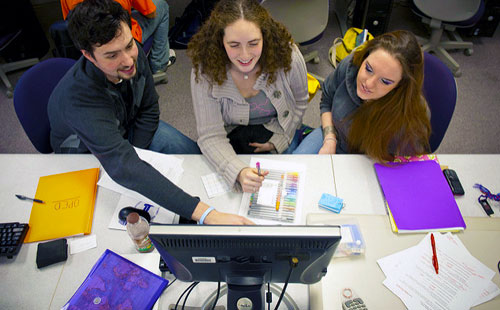Applied Geography Degree

If you're interested in a career in geography, cartography, geographic education, or geographic information systems (GIS), start with an associate's degree in applied geography. Coursework involves hands-on fieldwork, mapping projects, and research, and explores four related disciplines:
- Geography, the first discipline, is the study of places; it enables the graduate to function as a paraprofessional in a broad range of studies. The geography graduate assists in performing research and compiling data in activities connected with cultural and physical components of the environment, as well as city planning, marketing, transportation, and domestic and foreign area studies.
- Cartography, the second discipline, is the art and science of map construction; its skills enable the graduate to use, compile, and construct maps and related cartographic products.
- Geographic education, the third discipline, provides prospective teachers and currently employed teachers seeking to meet certification requirements in Montgomery County and Maryland with exposure to geographic concepts and methodology.
- GIS, the fourth discipline, combines the use of computer technology with the field of geography to help analyze and problem-solve spatial information.
Program Outcomes
Upon completion of this program, a student will be able to:
- Examine geography as a spatial concept and describe what it entails and how it is part of daily life.
- Identify where places are, including continents, countries, states, regions, cities, districts, islands, water bodies, physical features, and other defined locations.
- Interpret maps and atlases effectively and successfully use a variety of coordinate systems.
- Use maps and atlases as tools.
- Demonstrate geographic phenomena.
- Analyze, discuss, and compose key principles of geography through original research as well as formal and informal writing assignments.
Program Advising
Meet with your academic advisor regularly to discuss your academic plans and make sure you are on track to graduate and/or transfer. The program advising guide outlines the degree requirements and is meant to supplement the advising process.
Transfer Opportunities
Montgomery College has a long history of successfully preparing students for transfer to four-year institutions. See all transfer agreements.
Careers
For some positions listed, a bachelor's degree or higher may be required. Use the Career and Program Explorer to see a full report for this career field. See links below chart for further guidance and/or connect with a Program Advisor to discuss career goals.
- MC Student Employment Services: Speak with the Student Employment Specialist for help with resume writing, interviewing, setting up a College Central Network (CCN)new window account and other job search topics.
- Career Coach: Explore Career Coach to learn more about this career and/or discover related majors and in-demand careers based on your current interests! Take a Career Assessment and then browse careers and job opportunities in the area.
Curriculum
A suggested course sequence for students follows.
- All students should review the advising guide and consult an advisor.
- Find out about related programs and course in the Fields of Study section.
- Most courses have either assessment levels that must be met or prerequisites (courses that must be taken first). Part-time students and those who need to meet assessment levels or take prerequisite courses will take longer to complete a degree. An advisor will help make sure you are taking your courses in the right order.
- All degree-seeking students must take a central group of General Education courses in English, mathematics, arts, behavioral and social sciences, humanities, and science. These courses are included in the suggested course sequence below.
Suggested Course Sequence
Students should complete the required English and Math foundation courses within the first 24 credit hours. All students should review the Program Advising Guide and consult an advisor.
First Semester
- ENGL 101 - Introduction to College Writing 3 semester hours
- Mathematics Foundation 3 semester hours (MATF)
- GEOG 101 - Introduction to Geography 3 semester hours (BSSD)
- GEOG 240 - Introduction to Cartography 3 semester hours
- General Education Elective 4 semester hours (GEEL)
Second Semester
- English Foundation 3 semester hours (ENGF)
- GEOG 113 - Economic Geography 3 semester hours (BSSD)
- GEOG 130 - Global Geography 3 semester hours
- Natural Sciences Distribution with Lab 4 semester hours (NSLD)
- Elective 3 semester hours
Third Semester
- GEOG 105 - Cultural Geography 3 semester hours
- GEOG 124 - Physical Geography 4 semester hours
- GEOG 250 - Interpretation of Geographic Imagery: Use and Analysis 3 semester hours
- Arts or Humanities Distribution 3 semester hours (ARTD or HUMD)
- Program Elective 3 semester hours ‡
Fourth Semester
- GEOG 235 - Preserving Our Natural Heritage: The Geography of Conservation and Natural Resources 3 semester hours
-
OR
- GEOG 222 - Geography of the United States 3 semester hours
- Behavioral and Social Sciences Distribution 3 semester hours
- Program Elective 3 semester hours ‡
- Program Elective 3 semester hours ‡
* ENGL 101/ENGL 101A, if needed for ENGL 102/ENGL 103, or elective.
‡ Select from the following program electives GEOG 211, GEOG 251, GEOG 255, GEOG 260 or GEOG 270.
Related Programs and Courses
General Studies Degree
Students who major in general studies explore personal, professional, and academic areas of interest within a flexible framework supporting transfer.
Workforce Development and Continuing Education
MC offers a wide variety of noncredit classes. These courses are designed to help you upgrade your skills, pursue career training, or learn something new.